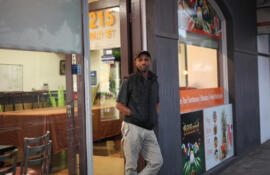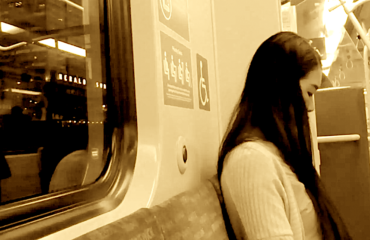Seven days after student activists set up camp under the sandstone clocktower at the University of Melbourne’s Parkville campus, the “Gaza solidarity encampment” has grown to around 80 tents pegged across the expansive South Lawn and a rolling daily schedule of peaceful actions drawing in hundreds of protestors.
Late Monday afternoon, the encampment erupted in cheers when news broke of the surprise resignation of vice chancellor Duncan Maskell from his $1.2 million a year position less than a year into his second five-year term. The announcement appeared to energise activists, with more than 300 joining a march to his office, adding “goodbye” to the usual chants demanding the university “disclose” and “divest” relationships with weapons manufacturers.

Protesters in high spirits outside the office of VC Duncan Maskell after he announced his resignation. Photo: James Costa
The university has publicly recognised ties with weapons manufacturers, including a $3.5 million “collaboration” with Lockheed Martin, an “industrial project” with BAE Systems and a partnership with Boeing, that supports an engineering ‘girl power’ camp program for high school students.
The university has strongly rejected claims by some protesters that as a consequence of these activities it is complicit in the Israel-Hamas war. But protestors have said they will not pack up camp until the university ends any relationships with potential involvement in – and condemns – what they describe as the “genocide” in Gaza.
The encampment is coordinated by Unimelb for Palestine, which describes itself as a “non-affiliated, grassroots” group of students, alumni and staff.
Organiser Nabil Hassine, a commerce student, said as the camp was being set up on Thursday that attempts to discuss concerns about the university’s affiliations had been met with “a wall of bureaucracy”, and that the encampment was “the culmination of not being listened to and not being heard”.
It started with 25 tents on Anzac Day, a movement initiated in solidarity with students in the United States. A wave of actions at various campuses was triggered when administrators at Columbia University in New York called in police to clear a pro-Palestine student encampment on 18 April. More than 100 students were arrested.
The occupation at the University of Melbourne followed a similar action at the University of Sydney. Camps have also appeared at the University of Queensland and the Australian National University in Canberra.
The actions signal a continuation, and potentially an escalation, of protests that have been rolling at Australian universities since the October 7, 2023 attacks by Hamas militants on Israel, killing about 1200 people and taking 253 hostages. Israel has killed more than 34,000 Palestinians in the war in Gaza, according to local health officials, around two-thirds of them children and women.
The Citizen has closely observed protests since the camp was established, and spoken to numerous activists. The majority of those participating are students from the University of Melbourne and from other Victorian universities, together with academic and professional staff members, alumni, and some activists from external pro-Palestine groups.
Numbers and activities wax and wane. On Saturday, protesters said they were so swamped with donations of food from supporters that they passed them on to a homeless charity. On Sunday, dozens of marchers from the weekly “Free Palestine” city rally turned up to hear students lecture on the “Military Industrial Academic Complex”. Monday afternoon’s rally appeared to be the biggest Gaza-related event on campus to date. Calls to prayer are broadcast each day over loudspeakers.

Nabil Hassine waves a Palestinian flag as protesters march to wish VC Duncan Maskell farewell. Photo: James Costa
Security has been highly visible across the campus, but there have been no public reports of incidents and officers appear to be keeping a distance.
In a statement, the Melbourne University Jewish Student Society said it supports the campers’ right to protest and hopes they “feel safe to express their solidarity”, but does not want the fears of Jewish students to be dismissed by protesters or the university. Late on Tuesday night, the Australasian Union of Jewish Students announced it would hold a “Keep Hate Off Campus” rally at Parkville on Thursday.
In an email sent to all staff last Thursday afternoon as the first tents appeared, Maskell said that the university respected peaceful protests but would not tolerate behaviours that may breach its policies.
In January 2023, the University of Melbourne became the first of a handful of Australian higher education institutions to adopt the controversial International Holocaust Remembrance Alliance’s (IHRA) definition of antisemitism.
Last year, over 100 Israeli and other civil society groups warned the United Nations that the IHRA code had “often been used to wrongly label criticism of Israel as antisemitic and thus chill and sometimes suppress, non-violent protest, activism and speech critical of Israel and/or Zionism”.
In speeches and banners, protesters at the University of Melbourne have described Israel as a “racist” and a “terrorist” state, raising the question of whether these might constitute a breach of the code.
Asked whether it would apply the IHRA code in assessing or responding to statements and chants at campus rallies, the university did not provide a direct answer. In a statement it said it “deplores and actively stands against all forms of racism, including antisemitism and Islamophobia”.
“The way that the IHRA definition has been used is precisely to categorise statements like that as antisemitic when they in fact are not,” says Dr Max Kaiser a historian and expert on antisemitism. He is also an executive officer of the Jewish Council of Australia, a progressive Jewish organisation formed after October 7.
“For any reasonable person, you can see that those sort of statements, some people might find them offensive or uncomfortable … but they don’t really reach a threshold where they are antisemitic or racist,” says Kaiser.
Dana Alshaer, an organising member of Unimelb for Palestine, says the encampment has a ban on any type of racism, Islamophobia and antisemitism, and that often, chants criticising Israel are led by Jewish members and “allies”.
University of Melbourne staff were warned in an email two weeks ago, that they would be in breach of the “appropriate workplace behaviour policy” if they were seen to take sides on the conflict while teaching or “in student facing contexts”. Staff in breach of this policy can face disciplinary action, including termination.
The Melbourne University National Tertiary Education Union said that it stood in solidarity with the encampment and echoed their calls for divestment from weapons manufacturers.
NTEU branch head David Gonzalez said that the university was targeting pro-Palestinian speech in ways that could undermine academic freedom, and claimed it followed universities in the US which were “using viewpoint neutral policies to silence staff”.
Another organiser, Deena El-Shabasei, who studies a masters of public health, wanted the university to be more transparent with students.
“We are not their subordinates, we pay to study here… we should know where our money is going,” El-Shabasei told The Citizen. “There’s no reason for them to keep that secret from us”.



